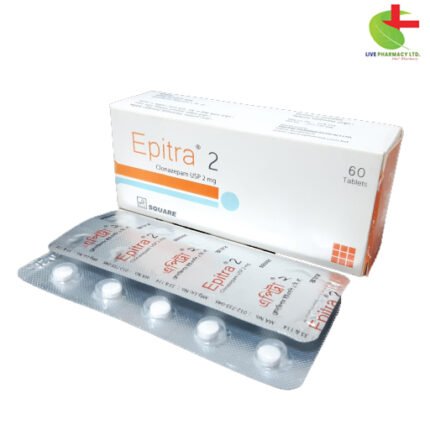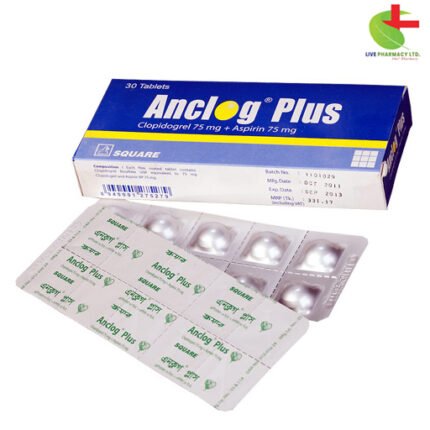Anclog 75
120.30৳ Strip
- Clopidogrel is a medication prescribed to reduce the risk of heart attack and stroke.
- It is indicated for conditions such as Acute Coronary Syndrome (ACS), recent myocardial infarction (MI), recent stroke, or established Peripheral Arterial Disease.
- By inhibiting platelet activation and aggregation, clopidogrel helps prevent the formation of blood clots.
- Administration is typically oral, with or without food, and dosage may vary depending on the specific condition.
- Caution should be exercised regarding potential interactions with other medications and the risk of bleeding complications.
 Brand
Brand
|
Square Pharmaceuticals PLC |
|---|---|
 Generics
Generics
|
Clopidogrel Bisulphate |
Indications
For patients experiencing Acute Coronary Syndrome (ACS), clopidogrel is recommended to lower the risk of myocardial infarction (MI) and stroke in those with non-ST-segment elevation ACS (unstable angina [UA]/non-ST-elevation myocardial infarction [NSTEMI]). Additionally, it is indicated to reduce the occurrence of MI and stroke in patients facing acute ST-elevation myocardial infarction (STEMI).
In individuals with recent MI, recent stroke, or established Peripheral Arterial Disease, clopidogrel is suggested to decrease the likelihood of subsequent MI and stroke.
Pharmacology
Clopidogrel functions as a prodrug, exerting its effects by inhibiting platelet activation and aggregation through irreversible binding to the P2Y12 class of ADP receptors on platelets. Its impact on platelet aggregation becomes evident within 2 hours following single oral doses, with steady-state inhibition typically achieved between Day 3 and Day 7 of repeated 75 mg daily dosing.
Dosage & Administration
For Acute Coronary Syndrome, an initial oral loading dose of 300 mg (equivalent to 4 tablets) of clopidogrel is recommended for patients requiring rapid antiplatelet effects, followed by a maintenance dose of 75 mg once daily. Administration without a loading dose may delay the onset of antiplatelet effects by several days.
For recent MI, recent stroke, or established Peripheral Arterial Disease, a daily oral dose of 75 mg without a loading dose is advised.
Interaction
Interaction with NSAIDs, warfarin, selective serotonin and serotonin norepinephrine reuptake inhibitors (SSRIs, SNRIs) may heighten the risk of bleeding. Avoid concomitant use of CYP2C19 inhibitors such as omeprazole or esomeprazole with clopidogrel. Similarly, caution should be exercised when using clopidogrel with Repaglinide due to potential increases in Repaglinide plasma concentrations.
Contraindications
Clopidogrel is contraindicated in individuals with hypersensitivity to the drug substance or any of its components, as well as those experiencing active pathological bleeding, such as peptic ulcer or intracranial hemorrhage.
Side Effects
While generally well tolerated, common side effects of clopidogrel include bleeding, diarrhea, gastrointestinal discomfort, hemorrhage, and skin reactions. Rare side effects may encompass acquired hemophilia, anemia, angioedema, arthralgia, arthritis, and bone marrow disorders.
Pregnancy & Lactation
There is limited data regarding the use of clopidogrel in pregnant women, and caution should be exercised. Its excretion in human breast milk is unknown, necessitating a careful risk-benefit assessment for nursing mothers.
Precautions & Warnings
Genetic variations in CYP2C19 metabolism (poor metabolizer status) and concurrent use of CYP2C19-inhibiting drugs like omeprazole and esomeprazole may impair clopidogrel’s antiplatelet activity. The prolonged inhibition of platelet aggregation increases the risk of bleeding, necessitating caution, especially during concurrent use of other medications affecting hemostasis or in patients undergoing surgical procedures with a significant bleeding risk.
Use in Special Populations
Safety and efficacy in pediatric populations remain undetermined, while no dosage adjustment is deemed necessary for elderly patients.
Overdose Effects
Overdose of clopidogrel may lead to bleeding complications, with platelet transfusion being a potential restorative measure to mitigate clotting impairment.
Therapeutic Class
Clopidogrel belongs to the therapeutic class of antiplatelet drugs.
Storage Conditions
Store clopidogrel below 30°C in a dry environment, shielded from light, and avoid freezing. Ensure it is kept out of reach of children.













Reviews
There are no reviews yet.